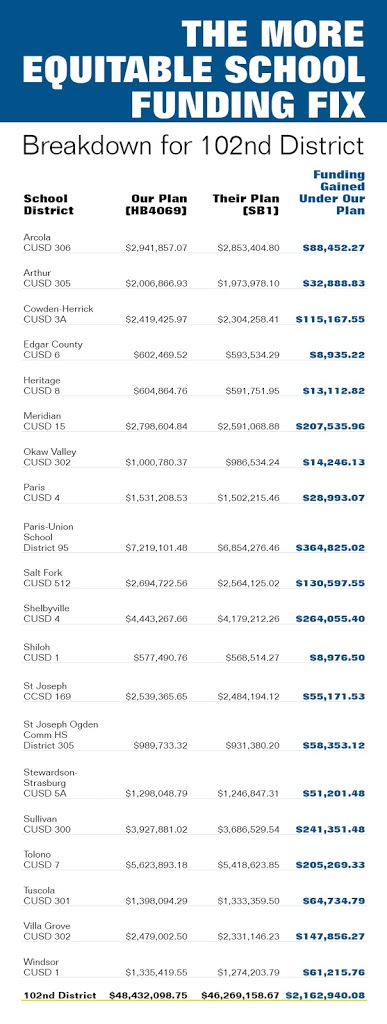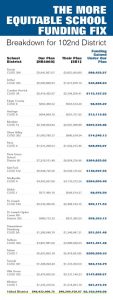Additionally, Senate Bill 1 was not adequately funded in the budget passed by Senate Democrats in late May, and without the necessary funding would once again lead to the proration that plagued Illinois schools for years. In fact, the Democrats have not advanced a budget bill that provides the appropriate funding level required to satisfy the simulation they are promoting with Senate Bill 1.
For these reasons, the Governor has promised to veto the plan, and legislators from across the state have made it clear that they will not vote to override a veto of Senate Bill 1. This means the fate of Senate Bill 1 is clear.
However, there is an alternative that reflects a compromise worthy of bipartisan support. One in which all school districts would benefit under the more equitable formula advanced under House Bill 4069. In the spirit of compromise, the proposal adopts the overwhelming majority of Senate Bill 1. In fact, there are far more similarities between the two bills than there are differences.
Both bills utilize the same evidence-based model, as well as the same methods to deliver funding to low-income students, along with identical systems to determine cost differences between districts. In addition, both measures group districts into the same four tiers based on need and use the same local resource calculations. Further, both proposals feature the same safeguards for English learners and special education funds.
In May the sponsor of Senate Bill 1 stated that the two proposals were 95 percent the same. Now, according to the sponsor of House Bill 4069, they are nearly identical, with a few important differences.
House Bill 4069 recognizes that Chicago needs help, and it provides the school district with assistance, based on evidence-based practices and the demographics of their students. What it doesn’t offer are special deals hidden in the formula that are designed to fix the Chicago Public Schools’ broken pension system and pay off their overwhelming debt from years of fiscal mismanagement. Instead, House Bill 4069 relies on the data, and the data alone, to drive resources to the schools that need it most, including Chicago.
House Bill 4069 is good for the 20 districts in our area and for all of our state’s 852 different school districts. Unlike Senate Bill 1, the legislation does not single out one district to pit students from different regions against each other. Instead, all schools are all treated the same under a formula that is the same for everyone regardless of their zip code. In fact, recently released data from the Illinois State Board of Education shows that House Bill 4069 in its current form is unquestionably more equitable for all low-income students in Illinois.

